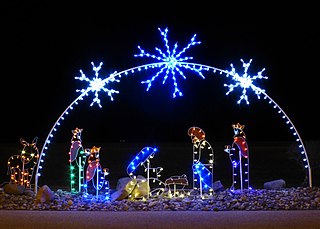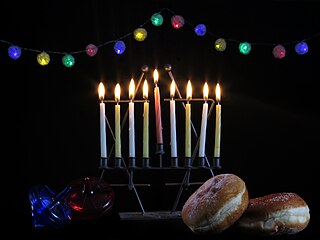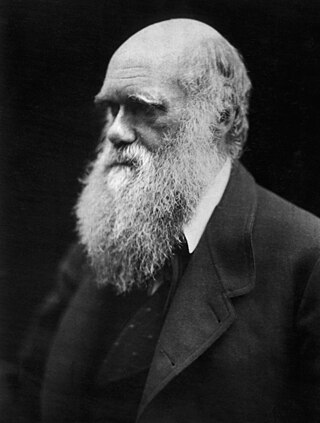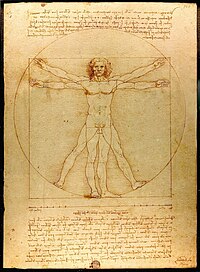
Christmas is an annual festival commemorating the birth of Jesus Christ, observed primarily on December 25 as a religious and cultural celebration among billions of people around the world. A feast central to the liturgical year in Christianity, it follows the season of Advent or the Nativity Fast, and initiates the season of Christmastide, which historically in the West lasts twelve days and culminates on Twelfth Night. Christmas Day is a public holiday in many countries, is celebrated religiously by a majority of Christians, as well as culturally by many non-Christians, and forms an integral part of the holiday season surrounding it.

Hanukkah is a Jewish festival commemorating the recovery of Jerusalem and subsequent rededication of the Second Temple at the beginning of the Maccabean Revolt against the Seleucid Empire in the 2nd century BCE.

A holiday is a day or other period of time set aside for festivals or recreation. Public holidays are set by public authorities and vary by state or region. Religious holidays are set by religious organisations for their members and are often also observed as public holidays in religious majority countries. Some religious holidays, such as Christmas, have become secularised by part or all of those who observe them. In addition to secularisation, many holidays have become commercialised due to the growth of industry.

Kwanzaa is an annual celebration of African-American culture from December 26 to January 1, culminating in a communal feast called Karamu, usually on the sixth day. It was created by activist Maulana Karenga, based on African harvest festival traditions from various parts of West, East, as well as Southeast Africa. Kwanzaa was first celebrated in 1966. 21st century estimates of how many Americans celebrate Kwanzaa are varied, from as few as a half a million to as many as 12 million.

Secular humanism is a philosophy, belief system, or life stance that embraces human reason, logic, secular ethics, and philosophical naturalism, while specifically rejecting religious dogma, supernaturalism, and superstition as the basis of morality and decision-making.

Advent is a season observed in most Christian denominations as a time of expectant waiting and preparation for both the celebration of the Nativity of Christ at Christmas and the return of Christ at the Second Coming. Advent is the beginning of the liturgical year in Western Christianity. The name was adopted from Latin adventus "coming; arrival", translating Greek parousia from the New Testament, originally referring to the Second Coming.

A wreath is an assortment of flowers, leaves, fruits, twigs, or various materials that is constructed to form a ring shape.

Humanists UK, known from 1967 until May 2017 as the British Humanist Association (BHA), is a charitable organisation which promotes secular humanism and aims to represent "people who seek to live good lives without religious or superstitious beliefs" in the United Kingdom by campaigning on issues relating to humanism, secularism, and human rights. It seeks to act as a representative body for non-religious people in the UK.

Christmas lights are lights often used for decoration in celebration of Christmas, often on display throughout the Christmas season including Advent and Christmastide. The custom goes back to when Christmas trees were decorated with candles, which symbolized Christ being the light of the world. The Christmas trees were brought by Christians into their homes in early modern Germany.

Darwin Day is a celebration to commemorate the birthday of Charles Darwin on 12 February 1809. The day is used to highlight Darwin's contributions to science and to promote science in general. Darwin Day is celebrated around the world.

A Hanukkah menorah, or hanukkiah, is a nine-branched candelabrum lit during the eight-day Jewish holiday of Hanukkah. Eight of the nine branches hold lights that symbolize the eight nights of the holiday; on each night, one more light is lit than the previous night, until on the final night all eight branches are ignited. The ninth branch holds a candle, called the shamash, which is used to light the other eight.

Christmas is the celebration of the birth of Jesus Christ, which, in Western Christian churches, is held annually on 25 December. For centuries, it has been the subject of several reformations, both religious and secular.

The Humanist Association of Ireland (HAI) is a Republic of Ireland secular humanist organisation that was founded in 1993 to promote Humanism, which they describe as:
an ethical philosophy of life, based on a concern for humanity in general, and for human individuals in particular. This view of life combines reason with compassion. It is for those people who base their interpretation of existence on the evidence of the natural world and its evolution, and not on belief in supernatural power.

World Humanist Day is a Humanist holiday celebrated annually around the world on the June solstice, which usually falls on June 21. According to Humanists International, the day is a way of spreading awareness of Humanism as a philosophical life stance and means to effect change in the world. It is also seen as a time for Humanists to gather socially and promote the positive values of Humanism.

The following outline is provided as an overview of and topical guide to humanism:

The Christmas season or the festive season; also known as the holiday season or the holidays, is an annual period generally spanning from late November to early January. Incorporating Christmas Day and New Year's Day, the various celebrations during this time create a peak season for the retail sector extending to the end of the period. Christmas window displays and Christmas tree lighting ceremonies are customary traditions in various locales.

Little Candles Day or Immaculate Conception Eve is a widely observed religious holiday in Colombia. It is celebrated on December 7 on the eve of the Immaculate Conception, which is a public holiday in Colombia. This day is the unofficial start of the Christmas season in the country, although the official day is the First Advent Sunday.

The Peace Candle is a tower-like structure erected every Christmas season in Easton, Pennsylvania. The approximately 106-foot (32 m) tall structure, which resembles a giant candle, is assembled each year over the Soldiers' & Sailors' Monument, a Civil War memorial located in the city's Centre Square. It is typically assembled in mid November and lighted over Thanksgiving weekend and disassembled in early February each year.
The Secular Solstice is a secular humanist event started in New York City in 2013 by Raymond Arnold. It is celebrated annually on the winter solstice by secular groups such as the Sunday Assembly and the rationalist community.
















